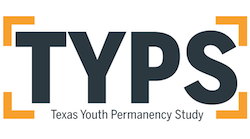From June through August 2020, we interviewed 54 youth (ages 15 – 20) who are currently participating in the Texas Youth Permanency Study. We wanted to gain a deeper understanding of how the COVID epidemic is affecting their lives, specifically related to school, work, social activities, and relationships in their home or placement settings.
Among our 54 participants, four had attained legal permanency through adoption (2 youth), reunification (1 youth), and permanent legal guardianship (1 youth). Twenty-two youth had reached age 18 without legal permanency; 10 had left the foster care system and 12 had chosen to stay in extended foster care, either in Transitional Living Programs and Supervised Independent Living Programs (6 youth), or in their long term foster homes (6 youth). The remaining 28 youth were still in foster care, the majority (25 youth) living with foster families and family members, and the others were residing in group homes.
Not surprisingly, the youth who had aged out to live on their own, or with a friend, dating partner, or relative experienced the most instability when the COVID-19 epidemic forced widespread lock down and job loss. The following case studies highlight the experiences of James*, Jessica*, and Aden* in negotiating the COVID-19 crisis.
James and Jessica both lost their jobs and soon afterwards their housing. While James was able to reconnect with his long-term foster parents who offered to take him in, Jessica was homeless at the time of the interview.
James* (19 years old) had aged out and gone to live with a friend, but he stayed in touch with his foster parents of four years. “I lost my job because of Corona. So, I had to come back over here, now, I’m living with my foster parents again. Well, I consider them my realistic parents. So, that’s why they allowed me to come back in here. It’s not in care. They supported me for a long time now. I’ve known them for about four years I think. My parents are really caring and all that. The fact that they give me a home in a time of crisis. The fact that they will supply me with food and shelter when I most need it. That’s enough for me. All I can ask.”
James’ experience highlights the importance of relational permanency, or having “realistic parents” in his life. While the relationship with his foster parents has had its ups and downs, they’ve never ceased to be there for him. James still plans on moving out and being independent once he can get a job. “Because I mean, of course, no one stays with their parents for their entire life. So, it’s like eventually, you have to move out. And I’ve already moved out once. I need to get back up on my feet, unless this COVID prevents me from doing it… If I don’t have an option, they wouldn’t kick me out because they care too much about me and wouldn’t wanna see me like that.”
Jessica* (19 years old) had left extended foster care “because at the placement that I was at, it was a lot of drama and lots of stuff going on over there.” Within the past year, she’s lived in more than five different placements, and most recently, she stayed with her biological parents. When both of them got incarcerated, she lost her housing. Now she’s found herself on the streets, trying to find a safe place to sleep during the COVID-19 lockdown, in addition to trying to obtain her ID and get a job. “I have nowhere to go right now. So, you can’t be in a spot since they’re closing everything down now. I applied at a few jobs today, but I am also trying to get an ID.”
She did not have anyone in her life that she considered a caregiver or resource and hoped to get a placement in a shelter. In fact, she had left the foster care system not trusting that anyone had her best interests in mind. “Like, I had no say so in it because if I did, they weren’t going for it. They would put me where they knew I will behave and be safe and not be in trouble.” She had graduated from high school, but her school experience and relationships with peers were limited. “I didn’t go to like public schools. I went to schools that were locked down, and charter schools, and stuff like that. I was always moving around so much. So, I never really got used to anybody. I don’t talk to anybody my age. I feel like it’s too much drama. Their drama, plus my problems with life, it’s too much.” Jessica’s struggles throughout the COVID-19 crisis are exacerbated by her loss of housing and employment, which have deepened the pervasive sense of distrust and disconnection that she has experienced in her life.
Aden* (18 years old) aged out of care during the COVID-19 crisis and decided to move in order to live with family outside of Texas. For her, being with family outweighed the risks of moving during the COVID-19 pandemic. “My family’s there. We all live in one house. I didn’t have family for very long. I have friends here and they’re longtime, lifetime friends.” Although she described having a close relationship with her aunt, she also talked about how living together during COVID-19 was stressful. “I wish I could have my own house. That’s my goal, to be on my own. Because it’s hard to find a job. I’m very independent, so a job is mandatory for me in my eyes. I don’t like to ask people for nothing, so without a doubt, it’s no life without a job. Now a lot of people are not hiring, and that makes it frustrating because I can’t work because of this virus. I just sit in the house all day and I get very, very depressed sometimes. I try to at least go for a walk or something. ”
At the time of the interview, Aden did have a job lined up and was hopeful. “I don’t want to live in [my aunt’s] house for the rest of my life. Next year is how far I want to be in my own place. It’s not about her… We’re too much alike to be living under the same roof.”
The stories of James, Jessica and Aden illustrate the importance of relationships that youth develop in care and that can continue to support them in the transition into adulthood. The Texas Youth Permanency Study seeks to identify factors that help youth sustain strong and supportive relationships when they exit out of foster care. Relational permanency is defined as lasting, loving, and accepting relationships with parental figures, such as foster, adoptive and birth parents, as well as siblings, friends, extended family, and dating partners. Enduring connections, emotional support, and a sense of belonging are associated with increased social emotional wellbeing and resilience when former foster youth tackle the challenges of adulthood.
To learn more about how the COVID epidemic has impacted youth still in care, click here.
*All names used in this blog are pseudonyms and are meant to protect the privacy of Texas Youth Permanency Study participants.

